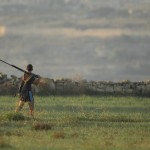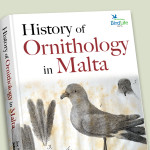The Griffon Vulture rescued by BirdLife Malta from the Malta Freeport last Friday is now safe in Sicily. Nicknamed ‘Maximus’, this Griffon Vulture (Gyps fulvus), rescued after being stranded on a Freeport crane, is by far the largest bird to have come to BirdLife Malta for care in the NGO’s lifetime. It arrived last Friday to Malta after it is thought it hitched a ride on a cargo ship while crossing the Strait of Gibraltar. After four days in BirdLife Malta’s care, Maximus was yesterday (Wednesday 8th June) transferred to a wildlife centre in Sicily to gain health and independence before being released at the Nebrodi Park, a site where a reintroduction programme for the species has been in place since 1998.
From the colour of its feathers, head and eyes, Maximus could be anything from one to two years old, and therefore a juvenile bird by Griffon Vulture standards. At this age Griffon Vultures cannot be sexed. Maximus was severely underweight and his condition required immediate treatment. The bird was yesterday morning accompanied by BirdLife Malta staff to Sicily, following which it was picked up by staff of the Istituto Zooprofilattico Sperimentale della Sicilia, with its final destination being the Parco Faunistico Venatorio Parco D’Orleans in Palermo, where the bird is currently undergoing further treatment to nourish it back to health.
As soon as it gains enough health and independence, Maximus will be prepared to join its similars at the Parco Dei Nebrodi, where the current population amounts to circa 100 individuals originally introduced from Spain. The bird will be fitted with a uniquely numbered ring which can be read from a distance, allowing its identification and monitoring, following which it will be transferred to an enclosure within the Nebrodi Park close to where the resident population is.
Given its discovery at the Freeport, and its rare occurrence in Malta, it is thought the vulture hitched a ride on a cargo ship on its way to Malta. The most likely suspect is a cargo ship that made a trip from Ecuador to Malta passing through the Strait of Gibraltar in the vicinity of which the bird is thought to have landed on the cargo ship. The ship entered Freeport on Friday early morning to offload containers, at which point the bird must have been disturbed and relocated itself on top of a crane, being too weak to fly any further distance. Maximus could therefore be of Spanish origin.
BirdLife Malta’s Conservation Manager Nicholas Barbara stated: “Despite looking impossible, I am glad we managed to convince all concerned that taking the vulture to custody was the best and only solution at this circumstance. I never handled a Griffon Vulture before or climbed a crane, however we had no time to wait and it had to be done. I am grateful to the ALE staff and the Freeport personnel who assisted me at the moment. Equipped with nothing more than a bed sheet, I covered the bird as it was asleep and we
then strapped it securely to ensure the bird would not harm itself or us, before taking it down to ground level”.
BirdLife Malta’s Conservation Coordinator Nick Piludu said: “The government authorities’ trust in BirdLife Malta giving care to this bird is commended. When we received news that the bird was to be given to our care, we immediately contacted our partners in Sicily, Greece and Hungary to get the best advice on how to bring it back to health. A few pounds of meat fed regularly to the bird sustained it until yesterday’s morning transfer to Sicily. We are hopeful Maximus is now in safe hands and look forward to seeing it being released at the Parco dei Nebrodi.”
BirdLife Malta would like to thank the Administrative Law Enforcement (ALE), Freeport staff and the Civil Protection Department for assisting in the challenging rescue of the Griffon Vulture. It would also like to thank the Wild Birds’ Regulation Unit (WBRU), the Government Veterinary Division and the Environment and Resources Authority (ERA) for trusting this unique case to the organisation, as well as for authorising and assisting in the logistics enabling the transfer of the bird yesterday morning. A final word of thanks goes to the Istituto Zooprofilattico Sperimentale della Sicilia for accepting to adopt Maximus, who will now sustain the Griffon Vulture re-introduction programme of the Parco Dei Nebrodi in Sicily.
Read the Maltese version of the press release here.



